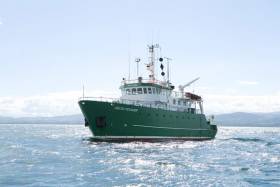Displaying items by tag: TTRS
Open Call For Training Through Research Surveys In 2018
#MarineScience - The call for applicants to take part in Training Through Research Surveys (TTRS) is now open to graduate and postgraduate students from across Ireland.
TTRS is a collaboration between the Strategic Marine Alliance for Research & Training (SMART) and the Marine Institute, which aims to increase national capacity in offshore marine research by providing placements on a range of dedicated research surveys.
TTRS surveys give students the opportunity to develop their careers in ocean science and gain hands-on research experience on board the Marine Institute’s research vessels, RV Celtic Explorer and RV Celtic Voyager.
Students can develop the skills required to work at sea including using advanced and up-to-date equipment and instrumentation as well as collecting and handling data.
Taking part in a TTRS survey enables students to establish new professional contacts with experienced scientists and researchers, as well as make a real contribution to the survey goals.
This year’s TTRS surveys are as follows:
- Anglerfish and megrim survey: Legs 1 (19-27 February), 2 (27 February-8 March), 3 (9-19 March) and 4 (10-20 April)
- Blue whiting acoustic survey (20 March-9 April)
- INFOMAR hydrographic survey (21 April-13 May)
- Western European Shelf Pelagic Acoustic Survey (WESPAS) Legs 1 (9-18 June) and 2 (3-24 July)
- Celtic Sea herring acoustic survey (7-27 October)
To take part in a TTRS survey, visit the Smart Sea School website and complete an online application form. To read previous participants' experience of TTRS, visit the SMART blog.
Applicants for Training Through Research Surveys:
- must hold a degree in marine-related science or technology or be in the final year of their undergraduate programme.
- must hold a valid ENG11 medical certificate and a Personal Survival Techniques (PST) certificate (STCW95).
- should have some prior seagoing experience.
Please note that ENG11 medical certificates must be renewed every two years and PST certification renewed every five years.
Information on obtaining medical and sea-survival certificates, and check lists for scientists embarking on national research vessels is available from the Vessel User Information page on the Marine Institute website.
TTRS participants are responsible for costs incurred in travelling to and from survey ports. For queries please contact [email protected].
TTRS surveys are supported by the Marine Institute. Grant-aided ship time is carried out under the Strategic Marine Research & Innovation Agenda of the Integrated Marine Plan for Ireland (Harnessing Our Ocean Wealth) under the Marine Research sub-programme of the Irish Government.
Participation in surveys is by kind agreement with the survey chief scientist. Applications are invited from graduate and postgraduate students of Ireland of Ireland higher education institutions.
























































